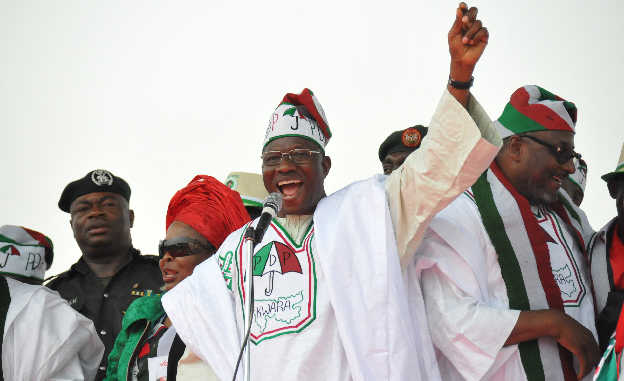Corruption has been the central theme of this year’s presidential campaigns. The elections in February, with all due respect to the litany of lesser candidates, will once again be a straight fight between the president, running on the PDP ticket and General Buhari, the APC candidate. A few days ago, Festus Keyamo published a diatribe, accusing the president among other things of not doing enough to fight corruption. Keyamo expressed a preference for the general whom he described as a ‘clear alternative’ and ‘rallying point for the … masses’ and the ‘only viable option.’
Keyamo is an accomplished human rights’ lawyer in Nigeria. In the spirit of his trade perhaps, he allowed for contrary opinions but immediately went on to denigrate anyone who held or attempted to vent them as having ‘betrayed their conscience and the people because of ethnicity and self-aggrandisement.’ Oh Festus. No. A laudable history in human rights’ advocacy does not inveigh in your views insurmountable wisdom or the preserve of morality. Here’s why.
Keyamo tacitly admits Buhari’s high-handedness in the general’s stint as military president but assures that any such tendencies will now be tempered by the checks and balances of a democracy. Yet, therein lies the flaw in the Buhari argument. If Buhari’s alleged efficacy in tackling corruption in his truncated tenure as dictator was by the compulsion and absolutism allowed him by military rule, how does he now propose to be effective in a liberal democracy where such devices are anathema?
We haven’t heard from the general himself beyond bare affirmations that he will fight corruption. He hasn’t elaborated any plan or strategy with which he will work the magic. He just says he will and his supporters want the rest of the country to lap it up? No, hard questions must be asked of him the same way Keyamo wants hard questions asked of the president.
Advertisement
Without a detailed anti-corruption plan by Buhari, Keyamo’s recourse is to the sheer force of character that Buhari purportedly possesses. But philosophers going back to at least Max Weber have disparaged this reliance on charismatic authority as the basis for any sustainable or desirable societal configuration. Modern societies, as Weber famously argued, are oriented towards legal-rational systemization rather than the cult of the person.
Corruption in Nigeria is systemic. It is rarely centralized or confined and permeates virtually all social strata. It is a habitual part of daily life – an expected element in nearly every social activity or transaction. It has been endemic for over half a century if the first coup speech in this country is anything to go by. Ultimately coming to terms with public-sector corruption may therefore be not so much about jailing one or two or even a hundred big men and women. It may be more about systemic change that removes the structures permitting or inducing corruption and theft of public funds.
There is evidence of a leaning towards the structural approach by the Jonathan government, whether wittingly or unwittingly. One of the justifications canvassed by Jonathan’s government for the removal of petroleum subsidies was to eliminate the large-scale corruption (by ‘subsidy cabals’) that subsidies made possible. It was a bold decision by the government, given the groundswell of opposition from the masses and the cabals’ potentially destabilizing influence (borne out of pecuniary power). The mark of courage and character (which Keyamo seeks) is often not in creating a populist ‘show’; rather it is in the willingness to take unpopular but necessary decisions.
Advertisement
A seeming preference for and the utility of a systemic approach to fighting corruption (by removing the structures making it possible) was less controversially demonstrated in the agricultural sector. President Jonathan’s administration has revealed that by the simple expedient of removing government from the purchase and distribution of fertilizers, it ended 40 years of monumental corruption that had cost the nation nearly N1 trillion. And with the end of the corruption-prone system, the government says, came more economic efficiency as bonus: fertilizers now reach up to 90% of registered farmers rather than just 11% under the old system. Arguably, it would have been possible to jail a few bureaucrats under the old system but the system itself would have remained. And so would the corruption, probably receding after a few jail sentences but exploding again virulently when prosecutorial microscopes moved elsewhere.
Keyamo reinforces his resort to charisma when he lauds Buhari as having the ‘character, the steel and competence to lead the nation.’ Yet what is the justification for this? Twenty draconian months in power in which the ‘best’ economic policies were doomed price controls and international trade by barter? The recent hapless handling of the WAEC Certificate matter definitely does not lend itself to these fabled claims of competence. Beyond the question of whether or not he has the qualification is the seeming levity and then ineptitude with which the general and his party confronted a constitutional matter of fundamental significance.
The APC screening committee was faced with the matter of requiring (sight) of the certificate and trifled with it before unwisely waiving it away. When it then became an issue between the parties as the campaigns heated up, we had a sworn affidavit which said it was with the army. When the army said they didn’t have the certificate, a hastily sprung statement of result appeared with comical features including a reasonably recent photograph of the general and a first name that at best approximates to what we know of his first name. And just when we thought the dust had settled, WAEC challenged the authority of the Katsina State Government to issue the statement of result.
Charity begins at home is the aphorism. If the general and the APC machinery could be put to so much trouble and be so clumsy in handling the small matter of a certificate that should be so easily within his personal control, wherein lies the confidence that they can expertly steer complex affairs of a convoluted state? Let us be clear again, this is a democracy and not a military government where orders must be obeyed down the hierarchy without question.
Advertisement
Keyamo tries to trivalise the certificate issue by saying that the sworn affidavit should suffice and that ‘leadership is [not] a function of academic degrees and qualifications … [but] … a divine quality.’ The statement is shocking coming from a human rights’ lawyer of Keyamo’s pedigree. The sociology of leadership is clearly a different thing from satisfying constitutional specifications on the minimum qualifications for becoming president of the federal republic. The constitution is not just law but jurisprudence’s hallowed grundnorm, the underlying basis for the state. When a question arises as to whether it has been complied with in fact, the answer must stand up to scrutiny including, where necessary, the ultimate test in examination by a court of law.
It is exactly in seeking to hold public figures to the highest standards of legal compliance and ensuring that the constitution is obeyed and the rule of law upheld that Keyamo has made his name in human rights. Many a time, when the Keyamos of the Nigerian human rights’ community have of their own volition litigated matters such as public officials’ qualifications, the popular refrain has been, ‘ah-ah, for this small matter?’ But they have forged on regardless and our democracy has been consolidated in no small measure by the totality of those often‑thankless efforts.
No person seeking high public office should be excluded from a similar level of scrutiny, on the evidentiary satisfaction of a fundamental qualification, simply because we feel that he possesses the right leadership qualities. Keyamo complains that no investigation has been ordered into his complaint about the certificates of the comptroller-general of customs but misses the irony of his position. Would a sworn affidavit suffice for Keyamo? Moreover, if the general had not found such favour in Keyamo, perhaps the eminent lawyer would be litigating the WAEC matter right now, seeking to test not only whether there has been due process but also the consequences of statements made under oath which were not borne out by subsequent facts. That is the kind of case that made Festus Keyamo.
It is election season and every Nigerian adult is entitled to his or her choice of who to vote for. Keyamo’s evidently settled for one side in the presidential contest and made it public. Like the good lawyer that he is, he has marshalled an argument which seeks to paint a one-sided picture in support of his choice. However, there are always two sides to a story and as the lawyers say, audi alteram partem – the other side will be heard too.
Advertisement
Dr. Ntephe is a lawyer and the chief executive officer of ERHC Energy (www.erhc.com), the Houston-based oil and gas exploration company.
Advertisement






